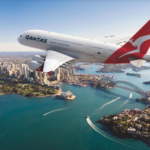 Qantas doesn’t expect demand for international travel to reach 2019 levels until 2024 – but the positive news is that the airline aims to have all 12 of its Airbus A380 jumbos back in service by that year.
Qantas doesn’t expect demand for international travel to reach 2019 levels until 2024 – but the positive news is that the airline aims to have all 12 of its Airbus A380 jumbos back in service by that year.
2024 has been repeatedly named, including by the International Air Transport Association (IATA), as the year international travel is likely fully to resume. See: 2024 is named yet again as the year when travel may resume
Qantas chief executive Alan Joyce said at Wednesday’s online CAPA Live forum that the airline expects to reactivate all 12 of its A380s, currently parked in “dry storage” in the Mojave Desert in California. The last Qantas A380, registration VH-OQI, flew from Dresden, Germany, to Victorville, California (gateway to the Mojave) last September.
At the time, Joyce said: “The A380s have to remain on the ground for at least three years until we see those international volumes brought back.”
That put the return at no earlier than 2023. Qantas, along with IATA, has now pushed it out to 2024, in line with many other tourism and aviation forecasts.
Confirmation that Qantas hopes to bring back its entire fleet of 12 A380s is good news, though Joyce reiterated at the CAPA Forum that he doesn’t see demand for international travel reaching 2019 levels “until 2024”, Executive Traveller reported.
In an optimistic flourish, Joyce added that if demand returned earlier, “we can reactivate the A380s within three to six months”.
“It could open up bubble by bubble, market by market.”
For Australians, the truth is that international travel will resume only when the government gives a green light to international borders opening. That depends on the progress of the pandemic globally, the rollout of vaccination in Australia and the extent to which any new mutant strains of Covid-19 can defeat vaccines.
Speculation had suggested Qantas might bring only half of its A380 fleet back into service, choosing the six planes that have already been upgraded with new seats and inflight lounges. The new configuration holds the number of First Suites at 14, adds six business suites (bringing the total to 70), adds 25 premium economy seats (pushing total to 60) and reduces the number of economy seats by 30 (to 341).
The year 2024 also cropped up in the latest quarterly forecast by Deloitte Access Economics.
9News quoted some of the Deloitte report, which was based on the premise that Australia’s vaccine rollout would overtake the virus mutating.
“For Australia, some form of quarantine will remain for some incoming travellers for some time,” Deloitte partner Chris Richardson wrote.
“That keeps international travel (both inbound and outbound) pretty weak in 2022, and it may not return to pre-pandemic levels until 2024.”

Glorious memory. Qantas A380 over Sydney Harbour a few years ago. Source: Qantas
Richardson wrote that “most of Australia’s economy looks on course to be close to pre-pandemic normal by Christmas 2021″ but Covid-19 mutations were likely to keep international borders “less-than-fully open for longer”.
A Deloitte Access Economics report on Australia’s hotel and tourism outlook, issued on 9 April 2021, can be read here. In that report, Deloitte’s partner and national tourism leader, Adele Labine-Romain, writes: “International travel is not expected to recover to near pre-Covid levels until sometime in 2023, with current projections of international arrivals 7% higher that year than 2019. This will be the result of pent-up demand stimulating strong demand in 2022 through to 2023.”
That’s a bit earlier than 2024. Labine-Romain writes: “We expect the pace of recovery to be different across the city markets. Brisbane and Perth are likely to see occupancy rates returning to 2019 levels by 2023, while the Gold Coast, Adelaide, Hobart, Tropical North Queensland and Western Sydney are expected to be slower to recover, largely due to their greater exposure to either business travel or international tourists, or both.”
Qantas and Air New Zealand each plan to launch trans-Tasman services next Monday, 19 April, when the quarantine-free trans-Tasman bubble opens. Qantas says it is still planning to resume some international services farther afield (to the US, Britain and Japan) from 31 October 2021, though that date is considered under threat by Australia’s sluggish vaccine rollout.
Finally, a word from Singapore, a major hub of regional and world travel. Singapore’s Foreign Minister, Vivian Balakrishnan, was asked last week at the World Economic Forum’s (WEF) Global Technology Governance Summit when he expected travel to return to pre-Covid levels. Balakrishnan told the Singapore Straits Times that this would require interoperability and trust between jurisdictions, together with a sufficient level of herd immunity globally.
Balakrishnan said he did not expect that to happen until about 2024.
Written by Peter Needham















